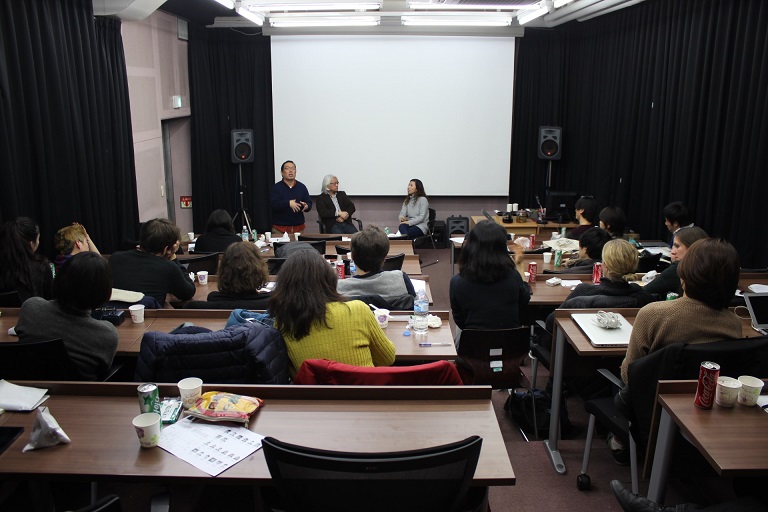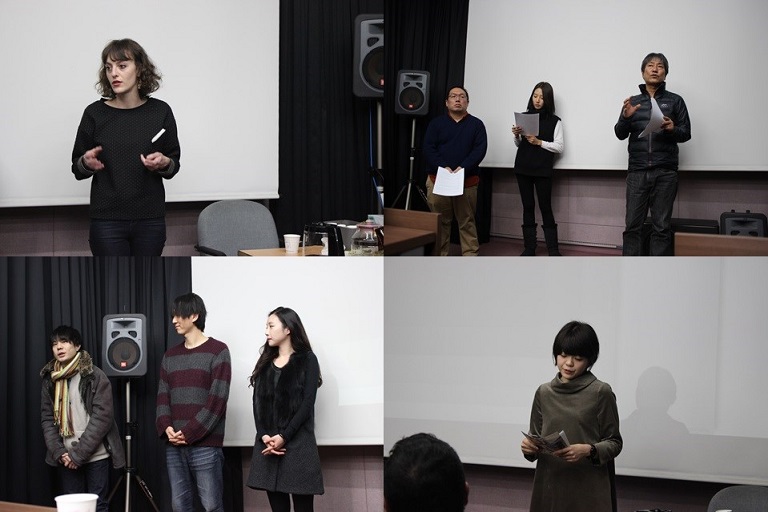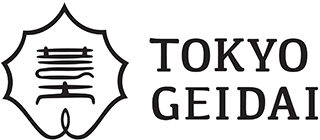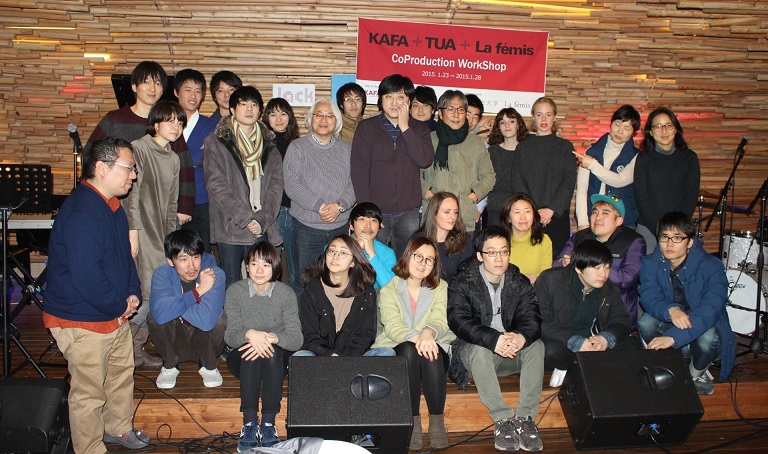GEIDAI-FEMIS-KAFAによる日仏韓合同ワークショップJoint Workshop by GEIDAI-FEMIS-KAFA
April 14, 2015
基本情報
研修者:映像研究科修士課程映画専攻13名
研修先:韓国国立映画アカデミー
研修期間:2015年1月22日~2015年1月29日
※この研修は、平成26年度藝大基金「海外派遣奨学金制度」のご支援により行われました。
海外研修の成果
この海外研修では、韓国国立映画アカデミー(KAFA)ならびにフランス国立映画学校(La Fémis)との交流活動として、各校の作品上映会・短編映画制作の合同ワークショップ・国際共同制作についてのシンポジウムを実施しました。
上映会では、各校の卒業制作を上映し、作品ごとに制作に関わった学生が予算・スタッフィング・撮影方法などを発表しました。技術面・演出面・体制面など、各国における映画制作のプロセスについて情報交換が行われ、差異・特徴やその背景にある考え方・個別事情などについて学び合うことができました。
合同ワークショップでは、各校の学生をシャッフルし、短編映画の制作が行われました。この制作過程でも各国の違いが表れており、例えば、KAFAの学生は撮影に入るまでに撮り方などを綿密に打ち合わせして決め、また現場では、「このカットが観客に物語の情報として伝わるかどうか」のジャッジがかなり厳しいと感じられ、その影響で、物語そのものとは無関係な「空白」の使い方について客観的になることができました。一方Fémisの学生は事前にしっかりとは決めず、どの様な作品にするかの方向性・テーマを重視している姿勢が見えました。このような体勢で撮影にのぞむと、Fémisの卒業作品のように映画が観念的になる、という発見も得ることが出来ました。
シンポジウムでは「合作の接近方法‐市場と作品」をテーマに、映画制作におけるグローバルな課題と可能性について、関連する事例をもとにプロの現場から招いたゲストと学生とで双方向の討論が行われました。フランスは国家からの援助が手厚く映画学校出身者への制作援助が豊富にあること、韓国ではVideo On Demandが盛んであり、学生の作品が誰でも見られるように配信されていること、日本の制作委員会方式が海外では稀であることなどが語られ、国際共同制作を視点とした具体的な話が交わされました。
今回の機会で初めて国外へ出た藝大生も数名おり、その学生達は、日本の外にも多くの素晴らしい才能を持った、しかし自分達と変わらない人々がおり、そうした人々との交流がとても刺激的で有意義なものであるとことを知り、まったく新しい意識をもって帰国しました。
個人レベルでの繋がりを得た学生も多く、帰国後もメールで互いに連絡をとっており、将来の仲間として今後再びの連携が期待されます。

交流活動の様子

各校学生の発表の様子
奨学金制度への謝辞
今回の交流活動を経て、海外に対する意識や人生観が大きく変わりました。こうした経験ができたのは、ご支援いただいた皆様のおかげです。本当にありがとうございました。今後も、藝大生たち・後輩たちが素晴らしい機会を得られるよう、この奨学金制度が続くことを望んでやみません。
This study abroad program aimed at promoting interaction among the Korean Academy of Film Arts (KAFA), the French national film school called La Fémis, and Geidai. During our stay in Korea, we organized a film screening of works created by each school, a joint workshop on short film production, and a symposium on international collaboration in filmmaking.
At the film screening, we showed each school’s final year projects. The students involved in the filmmaking talked about the budget, staffing, and filming methods. Through exchanging information on filmmaking process in each country in terms of techniques, directing, logistics, and so on, we learned about differences, characteristics, as well as perspectives and contexts that lie behind them.
At the joint workshop, all students from the three countries were mixed up into groups to make short films. Again, we experienced cultural differences in this filmmaking process. For example, the students from KAFA tended to be detail-oriented; They had a meeting to determine their plans before starting to film. When filming, also, they were strict about when to make a cut between scenes to communicate information effectively to the viewer. Thanks to them, we learned to be objective about the unnecessary “jump” in space/time in the story. The students from La Fémis, on the other hand, seemed to put more emphasis on the theme or direction of the story, and they were not making any concrete plans at the beginning. From the students of La Fémis, we learned that such an approach would lead to a conceptual film like the one produced by them.
At the symposium, we had an interactive discussion with an invited professional guest speaker on the theme “Approaches to Collaborative Filmmaking: The Market and Production,” where we talked about global challenges and possibilities of filmmaking by looking at relevant cases. We discovered that film school graduates in France can receive solid support for filmmaking from the French government. We also learned that the “Video on Demand” system is very popular in Korea and films made by students are available for anyone to watch. It was also pointed out that it would be rare in other countries to set up a production committee like the one in Japan. Thus, we were able to exchange specific information in light of international collaborative filmmaking.
For some Geidai students who participated in the program, it was their first trip abroad, and they returned home with a new mindset. They must have learned that there are many people outside Japan who are very talented but have a lot in common, and that it is exciting and meaningful to interact with people from different backgrounds. Some students were able to build their own network at the individual level, and are in touch with the students they met while in Korea. It is expected that they will become future partners and work together again.




